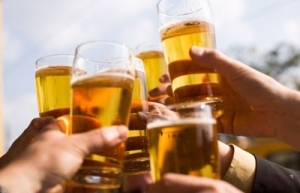Fork in road for special consumption tax on alcohol
 |
| Fork in road for special consumption tax on alcohol, illustration photo/ Source: freepik.com |
There are two sets of opinion related to amending the special consumption tax (SCT): to continue to apply the relative tax as a percentage and adjust the rate accordingly; or to use a hybrid system with a mix of relative and absolute taxes.
At last week’s conference on the issue, Nguyen Thanh Phuc, head of Public Affairs at Heineken Vietnam, said that for relative taxes, tax costs were based on the selling prices, regardless of alcohol content, with the government and related agencies hoping to reduce consumption.
“Beer with high prices but low alcohol concentration has less impact on health, while beer with low prices and high alcohol concentration is subject to higher SCT rates. Thus, the relative tax system is creating inequity in tax costs among products with the same alcohol concentration level,” Phuc said.
For the hybrid taxes, although the absolute tax causes a difference in the ratio of tax costs to revenue between products, this difference is not large because products with high consumption are currently a similar price, he added. “If the proportion of relative and absolute taxes is built properly and has a clear roadmap, the hybrid taxes can balance the disadvantages of both relative and absolute taxes,” Phuc said.
The impact of the economic recession and the effect of new drink-driving legislation in 2020 have already pulled down the purchasing power and sales output of the entire industry.
“In 2023, our company’s total sales volume dropped 20 per cent from the previous year, while the effects of conflict and supply chain disruption caused raw material prices to increase by 15-30 per cent,” said Nguyen Hoang Giang, general director of Saigon Beer Trading Company, a company owned by Sabeco.
For some time, the SCT was based on a percentage of the selling price because this was the most suitable method for the alcohol drink industry. It provided fairness in regulatory tax rates among product segments, and an automatic valve to fit with inflation.
“If a hybrid method is applied, imposing an additional absolute tax on a unit of product will immediately create price pressure on the market for low-priced beer, which are mostly popular Vietnamese brands. Because low-priced or high-priced products will be subject to the same absolute tax values,” Giang said.
If the selling price of low-priced popular products is kept constant, the selling price of high-priced products will be relatively cheaper and have a competitive advantage in the market.
“The consequence is that Vietnamese beer brands like Bia Saigon and Bia Hanoi cannot compete with high-priced beer products and will gradually be replaced,” Giang said.
Previously, the Ministry of Finance said that Vietnam’s alcohol tax only accounted for 30 per cent of the selling price, while in many countries, this proportion could be 40 per cent, or even as high as 85 per cent.
“It is sensible to raise tax through increasing SCT rates to sustainably raise revenue sources instead of changing tax calculation methods that can cause serious injury and shock for domestic Vietnamese beer brand manufacturers,” Giang added.
In the dossier of the amended Law on SCT, the ministry also submitted a proposal to the government to apply hybrid taxes for tobacco only, and not yet for beer or wine.
Nguyen Thi Minh Thao, head of Business Environment and Competitiveness Research under the Central Institute for Economic Management, said that alcoholic drinks are subject to the most tax policy changes.
“If we are making policy without impact assessment on the entire industry and relevant subjects, it will cause many issues in implementation. Therefore, consulting carefully with relevant parties is necessary,” Thao said. “When the drafting agency proposes tax calculation methods and tax rates, they should be synchronised and stable for businesses to do production and business. Adjusting policies should not include too many risks for enterprises.”
Vu Sy Cuong from the Academy of Finance said that it was necessary to thoroughly evaluate consumer behaviour, the impact on budget revenue, and the effect on production and business. “There needs to be specific evidence and figures, but the coordination and linkage mechanism between policymaking and research agencies is too loose,” he said.
The amended Law on SCT will be submitted and considered at the National Assembly’s meeting session in May 2025.
 | Alcohol, tobacco and soft drinks face increase in excise tax Alcohol, tobacco and soft drinks will be subject to an increased excise tax aiming to improve community health and tackle the national budget deficit as part of a comprehensive tax reform strategy for 2030. |
What the stars mean:
★ Poor ★ ★ Promising ★★★ Good ★★★★ Very good ★★★★★ Exceptional
 Tag:
Tag:
Related Contents
Latest News
More News
- Citi sharpens its focus on institutional banking (February 09, 2026 | 19:58)
- SSC steps up engagement with FTSE Russell on market reforms (February 09, 2026 | 17:33)
- IFC considers $50m trade finance guarantee facility for Nam A Bank (February 09, 2026 | 17:28)
- Hoa Phat Agricultural Development debuts shares on HSX (February 06, 2026 | 14:00)
- Vietcap’s VAD 2026 draws strong global investor turnout (February 06, 2026 | 13:30)
- New rules ease foreign access to Vietnam equities (February 05, 2026 | 17:29)
- 0.1 per cent tax proposed on each transfer of digital assets (February 05, 2026 | 17:27)
- Ministry of Finance tightens policy delivery at start of year (February 05, 2026 | 17:26)
- Vietnam steps up market reforms as FTSE Russell reviews upgrade progress (February 05, 2026 | 17:20)
- 2025 profits mixed amid strong energy and farming results (February 05, 2026 | 17:18)





















 Mobile Version
Mobile Version